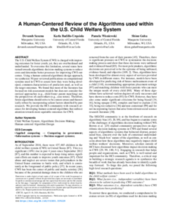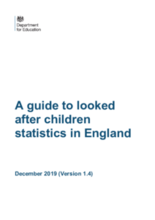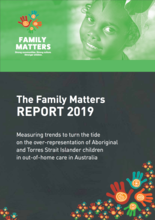Displaying 71 - 80 of 558
This publication from UNICEF showcases 18 reports from 2020 with a high potential for impact on policies and programmes that benefit children, including a report on deinstitutionalization in Bulgaria, a report on unaccompanied minors in Italy, and more.
Using a human-centered algorithmic design approach, the authors of this study synthesize 50 peer-reviewed publications on computational systems used in the U.S. Child Welfare System (CWS) to assess how they were being developed, common characteristics of predictors used, as well as the target outcomes.
This report reviews information on looked-after children in the UK at both national and local authority levels for the financial year 2018 to 2019.
This document provides a guide to looked after children statistics published by the UK Department for Education.
Cross-sectional analysis by the Scottish Government show that the educational outcomes for looked after children are much poorer than for other children in Scotland. This presentation will discuss methods to create a longitudinal data set from these data and thus infer how a child’s lifetime history of care relates to their educational outcomes.
In this study, the authors analyse a child protection services dataset that includes a network of approximately 5 million social relationships collected by social workers between 1996 and 2016 in New Zealand to test the potential of information about family networks to improve accuracy of models used to predict the risk of child maltreatment.
The purpose of this study was to use record linkage of birth cohort and administrative data to study educational outcomes of children who are looked-after (in public care) and in need (social services involvement), and examine the role of early life factors.
The Family Matters report sets out what governments are doing to turn the tide on over-representation of Aboriginal and Torres Strait Islander children in out-of-home care in Australia and the outcomes for children and their families.
Since 2017, The Chronicle of Social Change has been working to build the first public resource on foster care capacity in the United States, through the Who Cares project which collects data directly from each state, and combines it with specially obtained federal reports. This executive summary provides and overview of methodology and findings of the Who Cares project for 2019.
This study aimed to identify the factors that affect the incidence rate of neglected children in Indonesia by considering the household effect.





